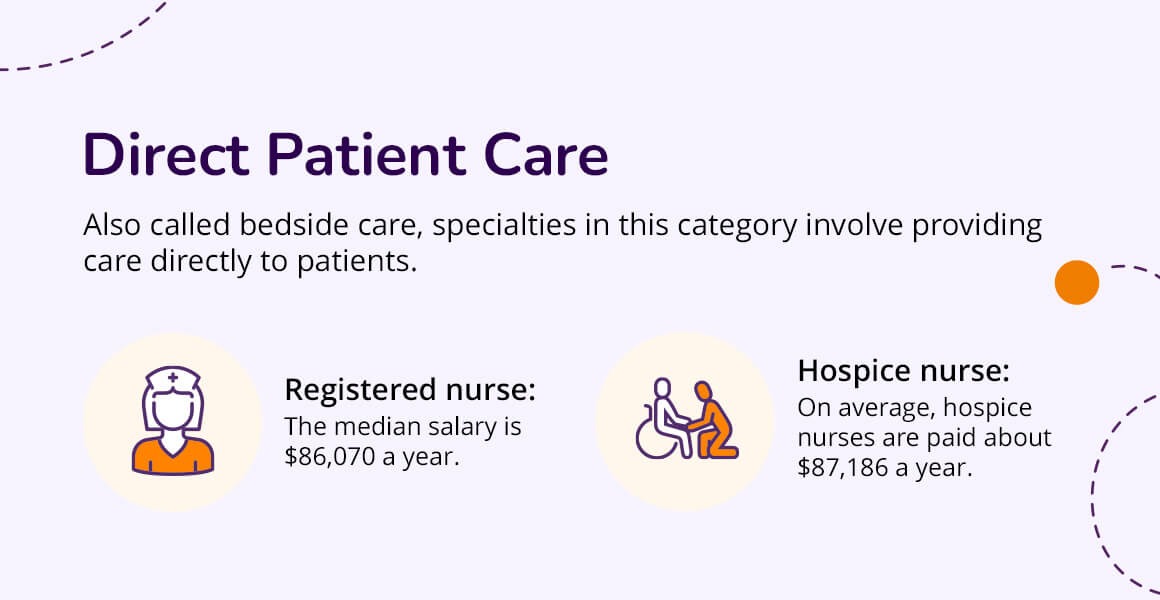An
company | Brands
Choosing the Right Nursing Specialty: A Guide
Blog/Choosing the Right Nursing Specialty: A Guide
Choosing the Right Nursing Specialty: A Guide
As you prepare to enter the world of nursing, it's easy to get lost in excitement and anxiety. After all, you've put a lot of work into reaching this point, but you still might not be sure what a nursing specialty is or where your passion is leading you. Should you work bedside? Focus on a more specialized form of care? Dedicate yourself to educating the next generation of nurses? There are a lot of challenging decisions to make, and choosing from the dozens of nursing specialties can be one of the hardest.
However, it doesn't have to be. Choosing a nursing specialty — a particular field of nursing you must complete additional education, training or certification to work in — gives you the power to align your career path with your priorities and needs. It's an opportunity for you to focus on work you find sustaining and rewarding.
With that perspective in mind, here's a few tips on how to choose a nursing specialty.
Self-Assessment
You want to build your nursing career around what you're good at and what you naturally gravitate toward. Therefore, understanding your own personality traits, gifts and perspective is a great place to start when planning your future in nursing. From there, you can find the nurse specialties that align with who you are.
Before starting this assessment, take a moment to breathe and focus on being honest with yourself. Try to assess yourself and your feelings as objectively as possible. Once you're ready, consider the following:
Personality: Are you high-energy or low-energy? Do you thrive in high-stakes situations or prefer your day to be more relaxed?
Interests: What naturally grabs your attention? Perhaps there's a field you find particularly fascinating, such as oncology, anesthesiology or management.
Skills: What nursing skills are you best at? Think about whether your teachers and peers talk about special strengths you have.
Values: What is most important in your life? You might prioritize your work-life balance or making a difference.
Preferred work environment: Where do you see yourself being the most productive and fulfilled? You might consider specialties in hospice care, pediatrics or the ER.
Writing down your answers can help you keep track of your priorities and even encourage a deeper understanding of yourself. Once you know yourself and what you want a little better, you can dive into in-demand nursing specialties and consider what might be a good fit.
Exploring Nursing Specialties
Within nursing, there is a wide range of specialties, but they can be divided into loose categories. These are very helpful in narrowing down your options so you can focus on the best fit for you, though you should also keep a sharp eye on career outlooks and salary as well. Some of the most popular nursing specialties include:
Direct Patient Care

Also called bedside care, specialties in this category involve providing care directly to patients. You might do everything from inserting IVs and providing medication to communicating with family members.
Registered nurse: The generic image of a nurse in your head is likely an RN. They provide many basic bedside functions to patients and interact heavily with other staff and patients' family members. The
median salary is $86,070 a year, and the occupation is expected to grow 6% between 2023 and 2033, a significant jump.
Hospice nurse: These RNs do exactly what it says on the tin — they care for patients who are in hospice. This work often involves comforting patients and family members as much as it does tracking medications and managing symptoms. On average, hospice nurses are paid about $87,186 a year.
Non-bedside Roles
The polar opposite of direct patient care, these positions are more administrative or educational in nature. If you want to work in healthcare in a more distant capacity, non-bedside work might be for you.
Nurse educator: These healthcare professionals specialize in training up-and-coming nurses in various settings. They might work at a local university or in the hospital itself, and their day-to-day consists of planning, conducting research and equipping their students for nursing work. The median salary is $62,860 a year.
Public health nurse: Want to engage in more outward-facing, community-focused work? You might just enjoy being a public health nurse. A PHN might coordinate an educational campaign in the morning and study newly published research in the afternoon. This position pays about $78,437 on average per year.
Specialized Care
Most specialized care positions involve direct patient care within a specific niche. Due to their complex nature, these roles often require additional certification and education before you can take them on.
Nurse midwife: Nurse midwives work closely with pregnant patients to ensure that pregnancy and labor are as smooth as possible and that their newborn is cared for. This work can be quite intense and fast-paced, emotionally and physically. The median wage is $129,480 a year.
Oncology nurse: Over 2 million people in the U.S. will be diagnosed with cancer in 2025, and oncology nurses help those patients fight back. They work closely with patients and doctors to make decisions about treatment and help to administer chemo. These nurses make an average of $91,094 a year.
The landscape of nursing is ever-changing, especially in the aftermath of the COVID-19 pandemic and with the age of the average American increasing. As such, it's always valuable to consult with teachers, peers and professionals to get the most up-to-date perspective.
Gaining Experience
While studying your options is useful, getting a feel for the work firsthand is even better. It can help you make more informed decisions and better understand the field you're entering. If you have the resources and opportunity, you might consider:
Shadowing nurses: Following a nurse for a day to see if you enjoy that specialization can help cut through decision paralysis.
Volunteering: Getting your hands dirty in a particular specialization is a surefire way to determine whether you like it.
Nursing internships: If you have the chance to work as an intern, you can develop your skills, connect with other nurses and find out what specialization might be a good fit for you. Some even pay.
Networking: Try to connect with other nurses through conferences, nursing organizations or online resources like LinkedIn. You might be able to learn from others' experiences and maybe even get a job.
Making the Decision
Once you understand yourself better and have evaluated your options and gotten some experience, it's time to choose. However, it's important not to be hasty. Before committing one way or another, consider the following:
What are your long-term career goals? Do you want to go back to school? Your specialty should align with your career and life goals. If it doesn't, it might not be the best option.
Who can you seek out for advice? Be willing to accept the mentorship of others and consider their perspectives. They might know you better than you do.
How will you continue to grow? Nursing offers many professional development opportunities, and continuing your education has many benefits. Your work should give you room to achieve your full potential.
Consider a Flexible Future With Travel Nursing

Your future in nursing is bright, no matter where you go. With that idea in mind, there's one last specialty to consider — a travel nursing specialty. At Trustaff, our team of one-on-one recruiters wants to connect travelers like you with high-paying nursing jobs across the country. We even offer customized pay packages and a unique clinician experience program, complete with mental health and wellness benefits.
Call us at (877) 625-1840 or apply today to find nursing work that fits your needs.


